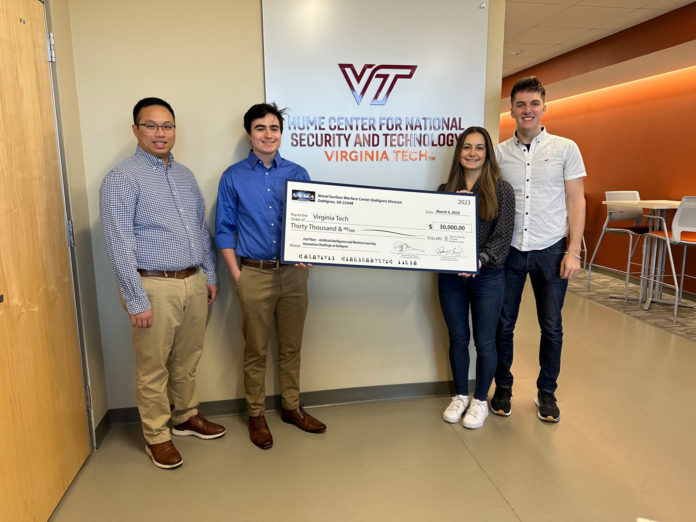A group of Virginia Tech students recently spent three days playing a version of Battleship that went well beyond a board game.
“We had to come up with an artificial intelligence or machine learning solution to a war game scenario where you have control of several ships and you have to coordinate actions for the ships to successfully defeat the incoming enemy threats,” said David Peterson, a senior majoring in networking and cybersecurity in the Hume Center MITRE workforce development program. “It’s kind of figuring out how you can minimize damage inflicted to yourself while making sure that you balance out normal assets versus high value ones to maximize your score in the game.”
Competing in the 2023 Naval Surface Warfare Center (NSWC) Dahlgren Division Artificial Intelligence and Machine Learning Development Challenge, the Virginia Tech team of four students won second place, taking home $30,000 to be split evenly among the team. The team was able to travel to the competition through funding by the Hume Center for National Security and Technology.
The competition took place at the NSWC Dahlgren Naval Base in Dahlgren, Virginia, and featured teams representing 10 universities, including Carnegie Mellon University, Cornell University, and the University of Virginia. The challenge required teams to develop artificial intelligence and machine learning algorithms for the automated scheduling and coordination of simulated directed energy, hypervelocity projectiles and other advanced weapon systems.
“Each day we were presented with a scenario,” said Danielle Reale, a senior majoring networking and cybersecurity. “You were able to go into a classroom and work with your team members to test it and try to make any adjustments to the code that was needed. Then at a certain time we would go down and they would run our specific code through their scenario and we would get a grade at the end and whoever had the highest score at the end of the day was in first place.”
While the problems the students were asked to solve were created for the competition, they are similar to real workplace situations in the field of networking and cyber security.
The team said the competition helped to give them real-world problem-solving experience that they couldn’t get in the classroom.
“From the coding perspective, you don’t get a lot of situations where you have something that you can test,” said Alex Downey, a senior majoring in machine learning. “There’s all this theory that we learn in class, but to actually get to apply that and see what the results of that application are in real time is rewarding. Going into the field it’s nice to have that experience where we have to really work under a time crunch like it’s a real project and see how we do.”
In addition, the students were able to network with students from peer-institutions who competed in the event, and with professionals in the national and cyber security industry.
“One of the best parts was getting to speak to industry leaders in the field. A lot of different company leaders came up to us during the competition. We just got to know who they were and what they did and what it’s like to work in that field. I think that will be pretty beneficial,” said Anthony Lee, a senior majoring in networking and cybersecurity.
The other universities to place in the competition were Carnegie Mellon, finishing in first place and being awarded $50,000, and the College of William & Mary, finishing in third place and being awarded $20,000.
Networking and cybersecurity and machine learning are just two of the 14 majors offered by the Bradley Department of Electrical and Computer Engineering.
Lindsey Haugh

